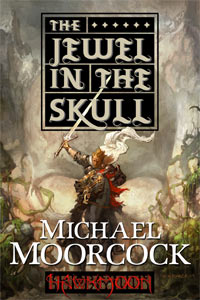OK, quick, from memory, which Moorcock books have you read? More importantly, what have you not (yet) read? I’ve been a devoted fan for 20+ plus years and have probably read, rough estimate here, maybe a third of his output. (I’m not even counting the music at all. Doesn’t sound like my sort of thing). Probably closer to a quarter. Probably less. Possibly a lot less. Close to nothing, maybe, relatively speaking.
I’ve read the Corum books, all six of them (there are only six, right?). Ditto Hawkmoon; also six. I have a good handle on the Corum and Hawkmoon books. I’ve read two of the Erekose books: the one with the elves, and the one with the ice. I think there was a third but I could never find it. Mother London and King of the City and Behold the Man and Blood and Fabulous Harbors and mumble-mumble-something-the-third-one. I read the Elric books, of course—but here I start to get nervous. I read what I think of as the real versions, i.e. the ones that I read as a teenager, albeit not in the prehistoric before-I-was-born short story format but collected as novels, up to and including the closer Stormbringer (its cover was a weird and unsettling shade of green); and also (some?) of the subsequently published novels, i.e. Fortress of the Pearl and the one with the Nazis; but then I recently read one of the Elric new collections they’re doing these days and it bears almost no resemblance to any of the stories I remember, which is both disturbing and fascinating. Is my memory at fault or are there somehow two Elrics? And let’s not even get started on Jerry Cornelius. . .
I still have the editions of the Corum and Hawkmoon books I had when I was, I don’t know, let’s say fourteen. The inside flap has a list of “other works by Michael Moorcock.” I’m not looking at it; I remember it very clearly. It fills the page, two or three columns across, with the sort of tiny crammed paper-preserving lettering a monk might use for a mediaeval bestiary; an extraordinary number of weirdly suggestive titles, far too many to be the output of one man, more like the product of the hip cultural scene of a moderately-sized European city, like maybe the whole of 1960s Vienna. This was before the invention of Amazon and eBay, and those titles drifted in and out of print, and most of them were basically impossible to find, though I did my best to look for them, god did I ever, because any one of those missing and for-all-I-could-tell possibly imaginary titles could be the one that was the key to the strangeness of the books that actually did exist, like the one book in the Library of Babel that must (it’s a mathematical certainty) be the book that contains the catalog of all other books. This seems to me to be the quintessential Moorcock-reading experience.
It’s not a matter of volume; there’s nothing that impressive about just churning out a lot of words. It’s more a matter of vastness, or perhaps plenitude is a better word (the etymology of vast suggests emptiness, which couldn’t be more wrong here). It’s the way Moorcock creates a feeling of texture and realness and significance through the suggestion of infinite complexity, in a way that I can’t actually analyze or explain so I will try to create the illusion of understanding it by referring to other, clearer blog posts, which in this case unfortunately don’t in fact exist. It’s a bloody good trick if you can get it to work.
Felix Gilman is the author of Thunderer, Gears of the City and The Half-Made World (coming in September 2010). He was born in London and now lives in New York.










